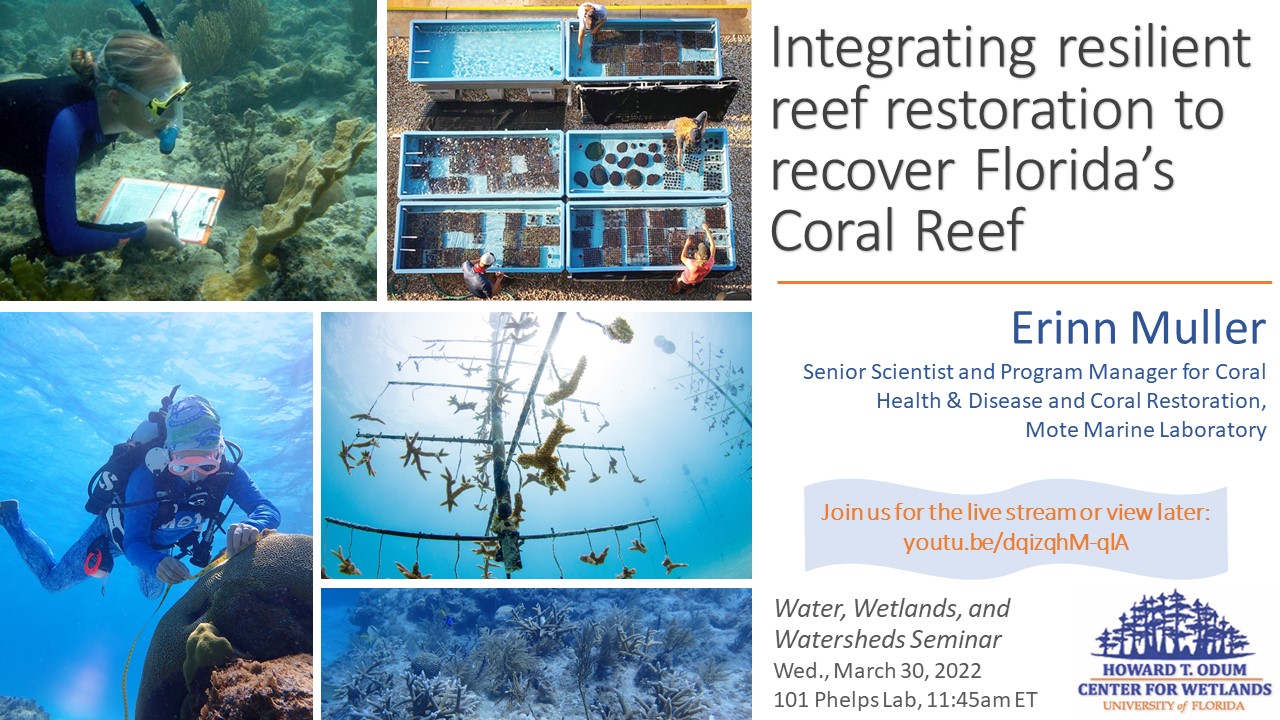Integrating resilient reef restoration to recover Florida’s Coral Reef
Erinn Muller, Associate Vice President for Research, Program Manager for Coral Health & Disease and Coral Restoration, Senior Scientist, Mote Marine Laboratory, Sarasota, FL
Join us for the live stream March 30, 11:45am EST: youtu.be/dqizqhM-qlA
(Please visit our youtube channel main page for the stream if there are any issues with the direct link.)
ABSTRACT
Coral reefs are one of the most biologically diverse ecosystems in the world, provide a wealth of ecosystem services, and are a major economic engine for coastal communities. Coral cover on Florida’s Coral Reef, however, has declined by over 90% in the last several decades because of several global and local threats such as climate change, ocean acidification and disease outbreaks leading to reefs on the brink of functional extinction. This unprecedented loss of corals has led to a regime shift towards active coral restoration, with organizations such as Mote Marine Laboratory leading the effort. Dr. Muller’s research aims to identify corals that are resistant to these major stressors, characterize the mechanism of resistance, explore potential life-history tradeoffs associated with these stress-tolerant traits, and thoughtfully integrate these corals to create more resilient restored populations. Her team focuses on recovering Florida’s Coral Reef by developing novel methodologies to transform coral reef restoration initiatives, ultimately increasing the long-term survival of coral reef ecosystems.
Bio
Dr. Erinn Muller is a Senior Scientist at Mote Marine Laboratory and the Coral Health & Disease and Coral Restoration Program Manager. Dr. Muller’s research focuses on identifying corals that are resilient to major threats such as climate change and coral disease to help inform Mote’s coral restoration activities. Additionally, her foundational research characterizes the spatial and temporal dynamics of coral disease outbreaks, while simultaneously studying the microbiome of healthy and sick corals to identify potentially pathogenic agents as well as beneficial microbes. For the last several years, much of her research has been associated with stony coral tissue loss disease, the most devastating coral epizootic to have ever been documented. Dr. Muller’s research is funded by the National Science Foundation, the National Park Service, NOAA, Florida Fish and Wildlife Conservation Commission, Florida Department of Environmental Protection, and through philanthropy. She received the prestigious Young Scientist of the Year Award from the International Coral Reef Society in 2015; only one recipient is recognized worldwide each year. In 2019, Dr. Muller received the Presidential Early Career Awards for Scientists and Engineers (PECASE). This award is the highest honor bestowed by the U.S. government to outstanding scientists and engineers who are beginning their independent research careers and show exceptional promise for leadership in science and technology.
POSTCARD

